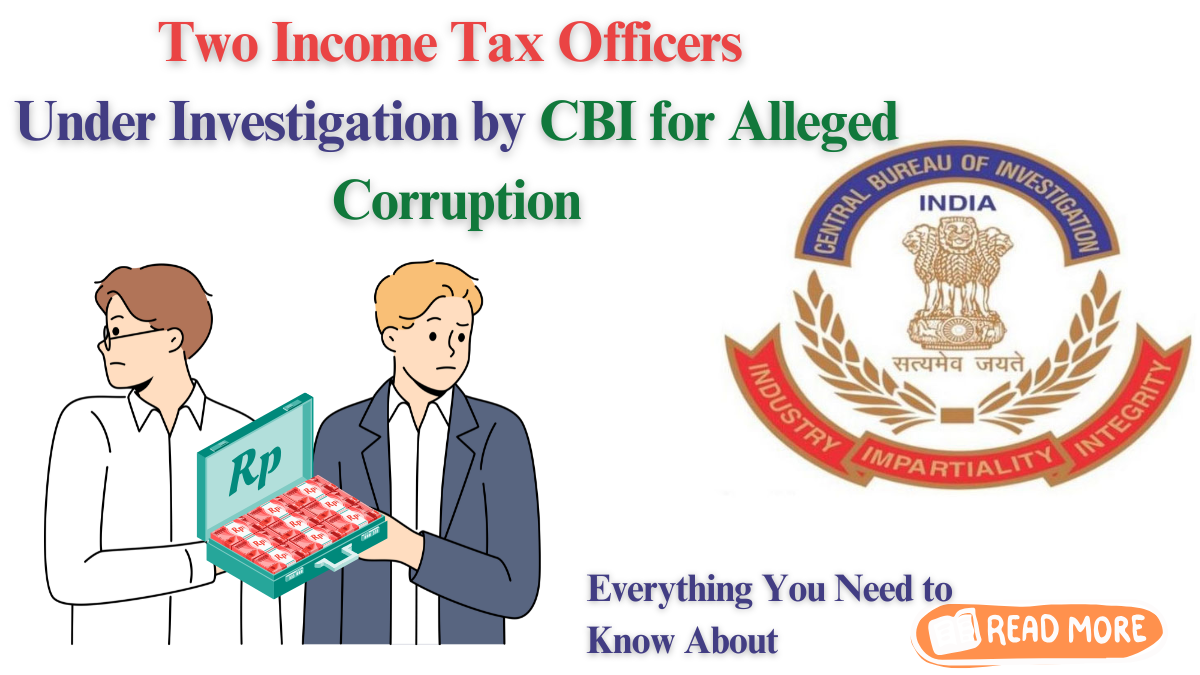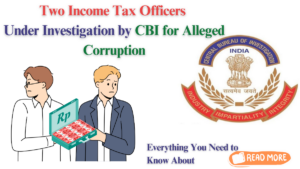What is Happening?
The Role of the CBI in Investigating Corruption
The Central Bureau of Investigation is India’s primary agency tasked with investigating serious crimes, including corruption, fraud, and other illegal activities within government departments and public institutions. Its mandate is to ensure that public officials, regardless of their position, are held accountable for any illegal or unethical actions. The CBI operates with the goal of maintaining the rule of law, fighting corruption, and ensuring transparency within public offices.
The CBI’s role in investigating corruption among public servants is critical in maintaining public trust in the institutions that govern the country. When cases like these emerge, the CBI’s intervention is necessary to ensure that the accused officers face appropriate legal proceedings and, if found guilty, are held accountable for their actions.
The Separate Investigations
In this instance, the CBI has initiated two distinct investigations, one for each Income Tax officer accused of bribery. While both officers belong to the same department, the cases involve different individuals and separate incidents of alleged bribery. Below are the key details of each case:
Case 1: Bribe Demanded to Adjust Tax Filings
In the first case, an Income Tax officer allegedly demanded a bribe from a taxpayer in exchange for adjusting their tax filings. The taxpayer, who had filed a tax return with the Income Tax Department, was reportedly asked to pay a significant sum of money for the officer to make favorable changes to their filing. This demand for a bribe in exchange for providing services that should otherwise be available without any undue influence or payment is a classic example of corrupt practices within government institutions.
The CBI’s investigation into this case is focused on collecting further evidence, including any communication between the taxpayer and the officer involved, to substantiate the bribery claim. The agency is also looking into other possible cases involving the accused officer to determine if this was part of a larger pattern of corrupt activity.
Case 2: Bribe for Reducing Tax Penalty
The second case involves a different Income Tax officer, who allegedly demanded a bribe in exchange for reducing tax penalties. In this case, the taxpayer reportedly faced a large penalty from the Income Tax Department, and the officer offered to lower the penalty if a bribe was paid. This situation highlights the abuse of power within the Income Tax Department, as officers are expected to enforce tax laws fairly and consistently, without any personal or financial gain.
As with the first case, the CBI is gathering evidence to corroborate the bribery allegations and determine the extent of the officer’s involvement in the crime. The agency is conducting interviews with witnesses, reviewing financial records, and examining the officer’s past dealings to build a case against the accused officer.
How Did the CBI Get Involved?
The CBI’s involvement in these cases was triggered by complaints from individuals who claimed to have been extorted by the Income Tax officers in question. These complaints were thoroughly investigated by the agency, and after finding substantial evidence of wrongdoing, the CBI registered formal cases against the officers. In cases of alleged bribery or corruption, the CBI often conducts its own investigation based on complaints from whistleblowers, taxpayers, or other sources, ensuring that public servants are held accountable for their actions.
The CBI is known for its thorough investigation process, which involves collecting both direct and circumstantial evidence. This can include financial documents, recorded phone calls, or video footage, along with witness testimonies. The agency works closely with other law enforcement bodies to ensure that its investigations are comprehensive and conclusive.
What Are the Consequences for the Accused Officers?
If the accused Income Tax officers are found guilty of accepting bribes, they will face severe legal consequences. Bribery is a criminal offense in India, and public officials found guilty of engaging in corrupt practices can face imprisonment, fines, and dismissal from service. The accused officers may also lose their pension and other benefits, depending on the severity of the offense.
Additionally, the officers may face disciplinary actions from the Income Tax Department, which could include suspension, demotion, or permanent termination from their positions. If convicted, they could also face legal proceedings in a court of law, where they will be subject to the penalties prescribed under the Indian Penal Code for corruption and bribery.
The CBI’s investigations will also likely result in closer scrutiny of the officers’ past activities. This could potentially lead to the discovery of other corrupt practices, further implicating the accused officers and possibly leading to additional charges.
Why Is This Important?
The investigation into these Income Tax officers is an important step in maintaining the integrity of India’s public services. Bribery within government departments undermines public confidence and hinders the effective functioning of the system. When individuals in positions of power exploit their roles for personal gain, it erodes trust in the government and damages the country’s legal and financial framework.
By taking swift action against corrupt officers, the CBI demonstrates its commitment to holding public servants accountable. The agency’s investigations serve as a warning to other officials who may be tempted to engage in similar illegal activities. Moreover, the outcome of these cases may serve as a deterrent, encouraging transparency and fairness within the Income Tax Department and other public institutions.
What Happens Next?
The investigations into both officers are still ongoing, and the CBI is expected to continue gathering evidence and conducting interviews. If the agency determines that the officers are guilty of corruption, they will likely face prosecution, with the case being presented before a court of law. In the meantime, the CBI will ensure that the officers’ actions are thoroughly examined, and appropriate legal actions are taken.
Conclusion
The CBI’s investigations into the two Income Tax officers over alleged bribe demands send a strong message about the agency’s commitment to tackling corruption in the public sector. As the investigations continue, it remains to be seen what the outcomes will be, but it is clear that such actions will help ensure greater accountability within India’s government institutions. If the accused officers are found guilty, the consequences will serve as a reminder that corruption will not be tolerated, and those who engage in corrupt practices will face the full force of the law.
Frequently Asked Questions
1. What charges are the Income Tax officers facing?
The officers are facing charges of accepting bribes in exchange for adjusting tax filings and reducing tax penalties, which are both criminal offenses under Indian law.
2. How did the CBI begin the investigation?
The CBI began its investigation after receiving complaints from individuals who claimed they had been extorted by the accused officers. These complaints led to a thorough investigation by the agency.
3. What are the possible consequences for the officers if found guilty?
If found guilty, the officers may face imprisonment, fines, dismissal from service, and the loss of pension and other benefits. They could also face legal proceedings under corruption and bribery laws.
4. What is the role of the CBI in these cases?
The CBI is responsible for investigating serious corruption cases involving public servants. In this case, the CBI is conducting separate investigations to ensure that the accused officers are held accountable.
5. Why is this investigation important?
The investigation is important because it sends a clear message that corruption within government departments, particularly in the Income Tax Department, will not be tolerated. It also serves as a deterrent to other public officials who may engage in similar corrupt practices.
Click here to learn more.
Pari is a passionate writer known for captivating stories that blend imagination and reality. Inspired by travel, history, and everyday moments, Pari crafts narratives that resonate deeply with readers.

